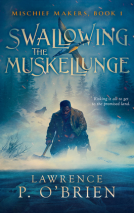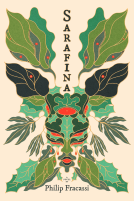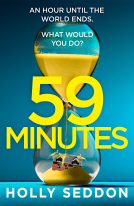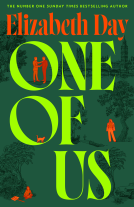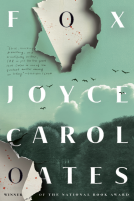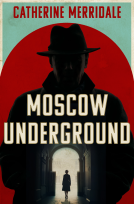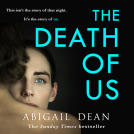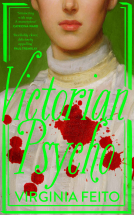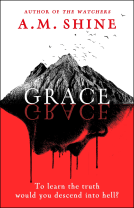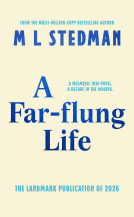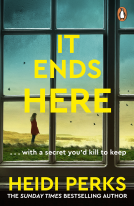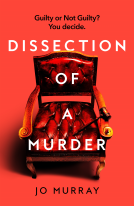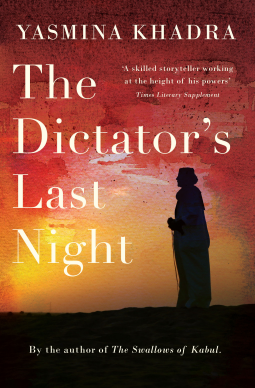
The Dictator's Last Night
by Yasmina Khadra
This title was previously available on NetGalley and is now archived.
Send NetGalley books directly to your Kindle or Kindle app
1
To read on a Kindle or Kindle app, please add kindle@netgalley.com as an approved email address to receive files in your Amazon account. Click here for step-by-step instructions.
2
Also find your Kindle email address within your Amazon account, and enter it here.
Pub Date 19 Oct 2015 | Archive Date 8 Dec 2015
Description
In this gripping imagining of Gaddafi's last hours, Yasmina Khadra delves into the mind of one of the most complex and controversial figures of recent history.
‘People say I am a megalomaniac. It is not true. I am an exceptional being, providence incarnate, envied by the gods, able to make a faith of his cause.’
October 2011. In the dying days of the Libyan civil war, Muammar Gaddafi is hiding out in his home town of Sirte along with his closest advisors. They await a convoy that will take them south, away from encroaching rebel forces and NATO aerial attacks. The mood is sombre. In what will be his final night, Gaddafi reflects on an extraordinary life, whilst still raging against the West, his fellow Arab nations and the ingratitude of the Libyan people.
A Note From the Publisher
$12.95 USD
Advance Praise
'...captivating and perversely delightful.' The Wall Street Journal
'Compulsive, funny, powerfully emotional..sinuously intelligent. Khadra’s perceptive and confident novel, translated from French by Julian Evans, is an unmissable entertainment.' The Guardian
'World-class' Rosie Goldsmith, The Independent
'Khadra brings us deep into the hearts and minds of people living in unspeakable mental anguish.' L A Times
“A skilled storyteller working at the height of his powers.” TLS
"Like all the great storytellers, [Khadra] espouses the contradictions of his characters, who carry in themselves the entirety of the human condition." Le Point
Available Editions
| EDITION | Paperback |
| ISBN | 9781910477137 |
| PRICE | £7.99 (GBP) |
Average rating from 23 members
Featured Reviews
 Maria Grazia B, Book Trade Professional
Maria Grazia B, Book Trade Professional
Most of us remember Gaddafi as a bloody dictator, implicated in stories still unclear as the Ustica massacre and the various attacks around the world, as well as the clown that established himself in European capitals with his tent and his court, sure to be honored in a servile way by Western leaders because he was holding the cocks of some natural resources so essential for us.
Then came the Arab spring with everything that followed, and we still don't know whether it was good or not. Maybe not judging from the trail of blood and cruelty stemming from the so-called spring.
The inglorious end of Gaddafi, his marred body, is printed on our retinas, and on those of Yasmina Kahdra, who reconstructs the last night of the dictator with a dense record and an epic inspiration, without making discounts to the dark side of the character, yet clarifying his historical stature.
I thank Gallic Books and Netgalley for giving me a free copy in exchange for an honest review.
 Sarah S, Librarian
Sarah S, Librarian
I loved the idea of this book and it was fascinating to read about Col. Gadaffi in a fictionalised setting. The book read very smoothly fir a translation too. However with the current situation in Libyia it felt somehow uncomfortable reading too. List to discuss however.
 Susan R, Reviewer
Susan R, Reviewer
This novel takes as its subject matter the controversial figure of Muammar Gaddafi, seen through the last night of his life. Gaddafi has retreated to Sirte after the fall of Tripoli in the Libyan Civil War; where the former dictator is holed up in a disused school, waiting for the arrival of his son, Mutassim, and hoping to break out and find refuge in another part of the country. While he waits, Gaddafi reflects on the Arab Spring, his life and those around him.
It is difficult to create a moving and sympathetic portrait of a man who divided opinion so strongly – both in his lifetime and since his death. Portrayed in the West as a vaguely comic figure, he was obviously feared by many in his own country, and, indeed, his own entourage, and the author manages to create a realistic portrayal of a man who is cornered and yet defiant. Reflecting on his Bedouin childhood, insults and slights – remembered and pored over – revenge, power and success; Gaddafi turns from feelings of despondency over his perceived situation, anger at the astounding ingratitude of his people and ministers and an inability to accept any dissent or criticism, even while asking those around him what went wrong…
Through Gaddafi’s fictional memories, the author manages to give us the essential history of a man who rose from poverty to change his destiny; heading a coup d’etat in 1969 to depose King Idris and having extraordinary power. By containing the book within this short, but incredibly stressful, time period, the novel feels extremely tense and gripping. Although we know the outcome, I did find the whole book simply riveting and was unable to put it down at the end. This would be an incredible choice for reading groups, with so much to discuss. Lastly, I received a copy of this book from the publisher, via NetGalley, for review. Highly recommended.
 zeb k, Reviewer
zeb k, Reviewer
This book by the marvelous Algerian writer, who writes under the pseudonym of Yasmina Khara, has written this story of the last day in the life of Muamar Gaddaffi. This short book (or novella), is written in the first person with Gaddaffi as the narrator. What does a man who knows he will not see another day think of in his last hours.
What does a man think of?? His accomplishment?? His missed opportunities?? His mistakes (if he made any)?? Or does his life flash before him??
These are the questions that Khadra tries to answer. From the time of his childhood, Gaddaffi knew that he was destined for greatness. He was a willful fatherless child who brought nothing but pain and misery to his mother. Mostly he wanted to know the true story of his father (which he was not to learn for years).
He talks about his time in military training and the friends he made (who later helped him lead the coup d’etat that overthrew the King). He talks about his children and his family, his hatred for how he was treated by his tribe when he was growing up, even though they had paid for his education. More than anything he talks about what he had done for Libya and how he had made his country respected all over the Moslem world.
It’s the ravings of a psychotic drug addict. I wonder if it was true that at the end of his life, Gaddaffi like Hitler had become a drug addict? Is it true or is Khadra giving in to rumor and innuendo? The end is Gaddaffi thoughts as he is dragged out of a water drain, beaten and eventually shot dead.
Is it true that all Dictators and psychotic, narcissists who cannot see when they have overstepped? Well, ask Saddam Hussein or any of the other “leaders” overthrown during the Arab Spring.
Zeb Kantrowitz zworstblog.blogspot.com zebsblog@gmail.com
 Douglas O, Reviewer
Douglas O, Reviewer
This is superb. I was on a plane and did not stop reading until I had finished. The ability of the author to infiltrate the mind and personality of Gaddafi is uncanny. It is very well written and compelling. It should be a film. There are phrases which linger in the reader's mind because they are so well written and so close to what might have been Gaddafi's own words.
 Anita W, Reviewer
Anita W, Reviewer
Yasmina Khadra's fictional account of Muammar Gaddafi's final days is compelling and thought provoking. The setting is the last hours of the Libyan civil war. Gaddafi is in hiding in Sirte, awaiting the arrival of his son and supporting troops to aid his escape. NATO forces are attacking the area and this incredible story imagines how Gaddafi faces, what will turn out to be, his final hours.
Gaddafi is an enigma. He improved housing, education and health care for Libyans and increased overall prosperity. But his foreign policy and political repression negated these achievements and he ended up vilified by 'the West' and his countrymen. Civil war in Libya in 2011 resulted in foreign support for the rebels and arrest warrant against Gaddafi.
In this poignant story, Gaddafi is aware that his days on earth are numbered and he reflects upon his past. From humble and unremarkable beginnings as a poor Bedouin, he has risen to a position of authoritarian power. He follows a military career, leads a revolt against the ruling monarchy and ends up leading Libya. He's a player on a world stage where he's been the piper and others, notably France, dance to his tune. But to what end?
He, and the reader, reflect on his actions, often violent, and the extent to which he'll be judged. His achievements count for little as he awaits his destiny. Tension builds as he and his handful of trusted supporters try to determine their best means of escape. It takes remarkable and skilful storytelling to venture inside the mind of a megalomaniac with both conviction and compassion. Yasmina Khadra's narrative is powerful and imaginative. It's a vivid account which has stayed with me.
Thanks to the publisher for an advance review copy via Netgalley.
 Reviewer 282220
Reviewer 282220
The last hours of Muammar Gaddafi as imagined by the author. Man or monster? Or both? I read this in one day as I couldn't put it down. Fascinating.
 Reviewer 203820
Reviewer 203820
He was one of the last great dictators in northern Africa: Muammar Gaddafi. His last hours are portrayed by one of the authors who know the region best: Yasmina Khadra. Hidden in a school, longing for his beloved son and reflecting about what he has achieved and made of his home country, Khadra depicts how Libya’s tyrant might have spent those very last moments of his life. Looking back at his childhood, where he as a boy without father was often teased, his time in the army, and the revolution which put him in the highest position. The underdog who achieved everything and dies god-alike, misunderstood by his followers, his country, the world.
From the ruler’s point of view we look at what we know from the news. His psychological state – far from any normal assessment of the situation – is described in a lively and very interesting way. Khadra creates a character who is fully absorbed in his view of himself and the world, who outlines his motivations to rise to the top and sketches his idea of a perfect ruler. His hubris can be felt in every line and one tends to believe, that this fictional picture of Gaddafi comes quite close to the real person.
Once more Khadra gives the western world inside into the Arabian ways of thinking and countries so close and yet so far away.
 Reviewer 205352
Reviewer 205352
Tense and gripping imagining of Muammar Gaddafi’s last hours.
No one can know what went through the head of Gaddafi in his last hours but Yasmina Khadra ably aided by Julian Evans translation creates a plausible and scary insight into what the Brotherly Leader and Guide of the Revolution of Libya might have been thinking.
The book begins with Gaddafi hiding in Sirte waiting for the arrival of his son, who is going to help him break out and find refuge in another part of the country. During the wait Gaddafi ponders his life, his current circumstances and the events that have brought him to this.
The book itself is short, but this keeps the tension high even though you know what will happen. Some scenes are not for the faint hearted, but it’s a very powerful story told very well.
 Donna M, Reviewer
Donna M, Reviewer
This book really intrigued me when I read the description so I was delighted when I was given the opportunity to review the book in exchange for my honest opinion. The book was good and quite easy to read but I didn't really find it as one for me.
 Karen H, Reviewer
Karen H, Reviewer
Not too many years ago it was rare to turn on the TV news without being confronted by images of the Libyan leader Colonel Gaddafi. A controversial figure from the time he seized power, his brand of nationalism, lack of regard for human rights and his financial support of revolutionary militants across the world brought him into conflict with the USA and UK. Even his death in October 2011 was mired with controversy with allegations he was found cowering in a disused pipe, then beaten and tortured by rebel soldiers.
Yasmina Khadra re-creates that final night in The Dictator's Last Night. Gaddafi is holed up in a disused school in home city of Sirte having been forced to retreat after the fall of Tripoli. His army is in tatters. He's besieged by NATO aerial attacks and surrounded by rebel troops of the National Transitional Council (NTC). His people have turned against him. He no longer knows who he can trust. Waiting for reinforcements and a convoy that will enable him to break through enemy lines and find refuge in another country, he reflects on his life as "Brotherly Leader" of his nation.
This is a portrait of a man of humble origins who is acutely sensitive to slights about his illegitimate descent from an impoverished Bedouin goat herder. He counters this by associating himself with the prophet Muhammad and with Isa Ibn Maryam, (Jesus Christ in the Koran), neither of whom knew their fathers. Alternately defiant and despondent, he remains supremely assured of his status as the chosen one", the one who enacts God's will.
People say I am a megalomaniac. It is not true. I am an exceptional being, providence incarnate, envied by the gods, able to make a faith of his cause.
Feeling betrayed by aides he believes are incompetent, he cannot even find comfort that his legacy will survive. He gave his people justice, replaced slums with sparkling shops and esplanades, built ultra modern hospitals but his crowning achievements are no more. Buildings are desecrated, the city pillaged, his portraits disfigured and his slogans eliminated. In truth he realises his people lied to him when they said they loved him.
I feared treachery inside my palaces but it was creeping up on me unsuspected in the towns and villages. ... I should have dealt with them the way I dealt with dissidents, been more severe with them, distrusted them more. ... If I had my time again I would exterminate half the nation. Lock them up in camps to show them what real work is, and watch them die in the attempt.
By restricting the action to the span of one night Khadra brings an element of dramatic tension to the novella. The ending is graphic though not gratuitously so. The main issue for me however was that I felt the book lacked depth. I wanted more of an analysis of Gaddafi's character but every time the novel edged towards an insightful point, it seemed to pull back. I was left with a disappointingly rather predictable portrait of an unstable mind who injects fear into all around him.
End Notes
Yasmina Khadra is the pen name for Algerian author Mohammed Moulessehoul, and the author of the best-selling The Swallows of Kabul. The Dictator's Last Night is published by Gallic Books and translated from the French original (La dernière nuit du raïs) by Julian Evans. I received an advance courtesy via NetGalley.
It had been a while since the last time I read a Yasmina Khadra's book but he is still one of my favorite author. In his special super simple way he has the ability to tell a very difficult story where we can almost empathize with one of the most dangerous and tyrannical man of the last 30 years. His own vision of Libia and of his role in guiding it outside the power of the western country and the reasons behind his defeat mostly; a pity that there isn't very much about the way he became the "brotherly guide", with a little help from some "Italian Friends", but ok, this book is all about the last night of the Rais before his defeat.
Era passato un po' di tempo dall'ultima volta che avevo letto un libro di Yasmina Khadra, ma lui resta comunque uno dei miei autori preferiti. Nel suo modo super semplice e lineare di rccontare le cose, abbiamo qui il racconto il prima persona da parte di Gheddafi, con il quale riusciamo anche ad empatizzare a tratti, nonostante sia stato uno degli uomini piú pericolosi e tirannici degli ultimi 30 anni. La sua personale visione della LIbia al di fuori della sfera di influenza dei paesi occidentali, il suo ruolo di guida del popolo e le ragioni della rivolta che hanno portato alla sua sconfitta. Peccato ci sia poco riguardo alla sua salita al potere, quella per la quale possiamo ringraziare anche qualche "amico italiano", ma ok, tutto sommato questo libro avviene tutto nell'ultima notte prima della sconfitta del Rais.
THANKS TO NETGALLEY AND GALLIC BOOKS FOR THE PREVIEW!
 Mandy J, Reviewer
Mandy J, Reviewer
The author of this original and insightful imagining of the last night of President Gaddafi of Libya actually met him once – albeit only briefly and in an official capacity. Whether this helped him get inside the mind of this most controversial of figures I couldn’t guess, but certainly what we get here is an eminently convincing and intriguing glimpse into the world of someone who ruled his country for 42 years and committed endless atrocities against his own people. It’s October 2011 in the final hours of the Libyan Civil War and Gaddafi is hiding out in his home town of Sirte. As all collapses around him he reflects on the journey that has brought him to this place and this predicament. It’s a short book but a powerful and compelling one. The dramatic tension is very well sustained even though the reader knows the outcome – something Gaddafi himself doesn’t, of course. Whether it’s an accurate exploration of the dictator's mind or not doesn’t really seem to matter. We can’t possibly know in any case. But it certainly feels credible, and I found it an absorbing and thought-provoking read.
I had such hopes for this novel. I read the news but there’s so much I don’t know about Libya and its former leader, Muammar Gaddafi. I thought this first-person account of the last few hours of his life would give me insights into the politics, economics and culture of the country which he ruled, and the factors that led to his downfall. And Gaddafi, with his vanity and guile and bizarre behavior, would make the ultimate unreliable narrator.
The novel begins with Gaddafi in hiding in a disused building, with just a few loyalists around him, contemplating what he sees as the failure of his allies and the treachery of his people. We are taken through a series of conversations, interspersed with his memories and thoughts on key events in his life, ending with his attempt to flee and his violent death at the hands of a militia.
The structure should make for great drama, so what went wrong? I think the key difficulty is the voice. Of course, any narrative, particularly a first person one, is a device, but it’s not clear who is speaking here. Are we reading Gaddafi’s innermost thoughts? Or is he, even now, trying to live up to his public persona? It’s not quite either. The prose at best is functional and there doesn’t seem to be a fully developed character animating the words.
What we get instead are some clunky exchanges of dialogue, and reminiscences which don’t really take you beyond the headlines. I didn’t feel I’d got a deeper sense of who Gaddafi was. How did he rise up from nothing? What was his appeal? What drove him?
There is some odd phrasing too. I’m not sure whether this is due to the original or the translation. But who, under any circumstances, never mind when lying in a drain facing imminent death, would muse, “A guide, though entrusted with a messianic mission, when he has official responsibility for a country, does not turn the other cheek”?
The book feels like one of those dramatised reconstructions you get in TV documentaries, where underemployed actors struggle valiantly to give life to chunks of exposition. Disappointing.
 Marina S, Reviewer
Marina S, Reviewer
The author takes us into the warped mind of Ghaddafi as he sits holed up in a secret location, trying to avoid both bombing and the wrath of his own people. There is little here to give you a profound insight into the politics or history of Lybia itself, but I found it a precise dissection of a dictator’s mind, how it is possible to become a megalomaniac and lose touch with reality, how power corrupts and idealism can get subverted, how tantrums can turn vicious when you are surrounded by sycophants. I thought it also raised some interesting questions about the appeal of tyrants: how they often play the nationalistic card (us versus the foreign menace, we’re going to make our country great once more etc.), which explains their rise to power and the often confused legacy they leave behind.
7th Continent:
Space – Solaris
voyageCentre of the Earth – Jules Verne
I’d forgotten what fun this classic novel is to read – yes, even when the author enumerates all of the things Axel and his uncle the professor take with them on their expedition. Appeals to the geek in all of us, but also lessons to be learnt about how quickly he gets to the intrigue, how imaginative he is, how endlessly inventive. It’s not even remotely plausible scientifically – that underground sea alone is completely wrong for all sorts of reasons. So it’s not as good as some of his other novels, but still a rollicking read (best discovered in your youth, though).
Posted on December 14, 2015Categories ReviewsTags 7th continent, Africa, American Samoa, Asia, Australia, Costa Rica, Global Reading Challenge, India, Israel, Jules Verne, Lybia, Mexico, Moldova, Morocco, North America, Poland, reading, South America, space, Yasmina Khadra2 Commentson Global Challenge? Only Just… Edit
Friday Fun: Treehouses Ahoy!
Don’t you feel safer and cosier up in a tree? Must be ancestral urgings… Luckily, this is a post for which I did my ‘research’ earlier, as my hard disk seems to be dying and I don’t know how much longer I will be able to use the laptop.
Roost, designed by Antony Gibbons, from his website.
Roost, designed by Antony Gibbons, from his website.
Wilkinson Residence, from That Oregon Life.
Wilkinson Residence, from That Oregon Life.
Interior of the Wilkinson residence, That Oregon Life.
Interior of the Wilkinson residence, That Oregon Life.
Birds' Nest, Sweden, from treehotel.se Birds’ Nest, Sweden, from treehotel.se
Interior of Bird's Nest, treehotel.se Interior of Bird’s Nest, treehotel.se
Japanese teahouse by Terunobu Fujimori, treehouselove.com Japanese teahouse by Terunobu Fujimori, treehouselove.com
Terrace of a treehouse, from Cipriani Charles Designs on WordPress.
Terrace of a treehouse, from Cipriani Charles Designs on WordPress.
Posted on December 11, 2015Categories UncategorizedTags escapist pictures, Friday Fun, treehouses15 Commentson Friday Fun: Treehouses Ahoy! Edit
#DiverseDecember: The Expatriates by Janice Y.K. Lee
My Diverse December reading initiative started with a white-knuckle ride of a novel ‘The Killing Lessons’ by Saul Black (aka Glen Duncan). Well written and scary thought it was, it disappointed me in two respects: the over-the-top Hollywood explosions and violence; and the fact that there was nothing about it at all to signal that it was written by somebody from an ethnic minority. Far be it from me to suggest that BAME writers should stick to BAME themes – but there was no ‘alternative point of view’ to introduce that elusive element of diversity that I was hoping to find in my Diverse December reading.
expatriatesSo it was with some cultural relief that I turned to my second book in the reading initiative: ‘The Expatriates’ by Janice Y.K. Lee, which is about different categories of expats living in Hong Kong. The author herself is of Korean origin, grew up in Hong Kong and studied and worked in the US, so weaves in all these diverse elements in her story.
This is the story of three women living as expats in Hong Kong and how their lives intersect over the course of roughly 18 months. Hilary is a wealthy housewife living in a placid marriage of convenience where very little real communication takes place. She is frustrated by her inability to conceive and toying with the idea of adopting a mixed-race boy from the orphanage, but closes her eyes very deliberately to anything that is less than perfect about the expat life.
David follows her lead, is amenable to what she wants. Their relationship has cooled in the meantime, cooled into politeness and well wishes, but she pushes that thought away, because how many difficult thoughts can one handle in one sunny afternoon?
Margaret used to love her job in landscape architecture, which is nearly impossible to pursue in the cramped neighbourhoods of Hong Kong, so she has devoted herself to her children instead. Yet we sense she is not quite satisfied with her loss of identity, that she remains critical of expat attitudes and is more self-aware than most. The author implies that expats are the new colonialists.
This was what bothered her: the presumption of the expatriates in Hong Kong. It is unspoken, except by the most obnoxious, but it is there, in their actions. They way they loudly demand ice in their drinks or for the AC to be turned up or down or for ‘Diet Coke, not Coke Zero’, as if everyone thought such a distinction was crucial. The idea, so firmly entrenched, that they could be louder, demand more, because they were somehow above – really, better than – the locals. How did that still exist in this day and age? And it was in her.
Finally, Mercy is the child of Korean immigrants to New York, who made her family proud with her Columbia degree, but who has since struggled to secure a job, to find purpose in her life or even a steady boyfriend. She is neither American nor Chinese, and she is often made to feel inferior to her peers.
Hong Kong was supposed to have been a new start – if one could say on needed a new start at the age of twenty-four… People were friendly. She found her cheap apartment and felt that she was getting a foothold. Then the office door was locked one day, the publisher went under and she didn’t have a job again. Then it became a sort of roller-coaster where she had a job, then didn’t, then got another lead… lurching from one near-missed opportunity to another… She sits at home, eats almost nothing, looks at her dwindling bank account online and wonders when she’s supposed to start her life again, when she is allowed.
Hong Kong skyline, from Wikipedia.
Hong Kong skyline, from Wikipedia.
Of course, we soon realise that there is something deeper going on underneath all this vague malaise. Margaret’s life has been touched by tragedy and she has become numb and detached. Mercy has involuntarily played a part in that tragedy and she is about to impact upon Hilary’s life as well. The balletic moves that the author imposes upon her characters, how they dance in and out of each other’s conscience and line of sight, how they change and develop (in a rather mechanical and rushed way towards the end) reminded me of soap operas at times. The plot is far less interesting than the wry, witty, sometimes acerbic observations of expat life, the often patronising encounters between expats and locals, and the subtle hierarchy between the different ‘types’ of expats (and how the Americans end up huddling together). The artificial setting and the lifestyle of the arid expat bubble are described to perfection, but I’d have liked to find out more about secondary characters like Chinese Olivia or supermom Frannie, who was seen crying in her car once. All too frequently the most interesting aspects happen ‘off-stage’, are not part of the main story and are recounted in anecdotal fashion, rather like in a magazine article (the author used to be a journalist on women’s magazines, and this sometimes shows in her breezy style).
This is the Hong Kong curse that expat housewives talk about in hushed voices: the man who takes to Hong Kong the wrong way. He moves from an egalitarian American society, where he’s supposed to take out the trash every day and help with the dinner dishes, to a place where women cater to his every desire – a secretary who anticipates his needs before he does, a servant in the house who brings him his espresso just the way he likes it… – and the local population is not as sassy with the comebacks as where he came from… The rental buildings are littered with the ghosts of ruined marriages… a man lost to the paid hostesses who found his every utterance completely fascinating… a welcome relief from the woman he faces at home, complaining about his travel, his schedule, his lack of time with the kids. So why not change it up? Why not trade up? Or down, and have some fun?
…the man just starts his life anew, with a younger model of a wife, sometimes a slightly smaller apartment, but his new life pretty quickly looks like his old one… To add insult to injury, in his fervor not to mess things up again… when he has more children, he vows to really do things right this time, so he pitches in to an unimaginable extent, does more with the kids… so the new family gets the benefit of this new and improved man, and the old family gets to see it all.
Author photo fro hk-magazine.com Author photo from hk-magazine.com
I’ve quoted somewhat extensively from this, because there is much I recognise in the shallow, smug and insular society she describes, although Geneva is less extreme than some other, more isolated locations. The expat community forms the backdrop to the crime novel that I’m currently working on, so I was paying close attention to the ‘show vs. tell’ ratio. I couldn’t help feeling that this erred a little on the ‘tell’ side of the spectrum.
The sterile and claustrophobic environment, the fact that everyone seems to know everyone else within the English-speaking community, can make tensions run high and unpleasant secrets will be exposed at the most inconvenient of times. I would perhaps have enjoyed this more if there had been a murder or two! The conclusion left me nonplussed: if these women could only forgive each other and bond over that most marvellous achievement of all – motherhood – everything will be all right. This felt too facile and rushed a conclusion, when everything leading up to it had shown that the reality is far more complex and nuanced than that.
But, overall, an entertaining book providing a window into a world far removed from the everyday most of us experience. I would recommend it to anyone contemplating a move to Hong Kong or elsewhere as a ‘trailing spouse’ – although, be warned, it might put you off it for good! I think I might also take a look at the author’s debut novel The Piano Teacher, set in Hong Kong in the 1940s/50s, a period of political and social turmoil.
Posted on December 9, 2015Categories ReviewsTags Diverse December, expat community, Hong Kong, Janice Y.K. Lee, motherhood, The Expatriates, women16 Commentson #DiverseDecember: The Expatriates by Janice Y.K. Lee Edit
The Poetry of Blog Posts – 2nd Attempt
Last year I tried to take the first sentence of the first blog post of each month to give me a snapshot of the year – and realised, to my dismay, that the truly meaningful parts of the year had been left unsaid. So I thought I would give it another go this year, to see if 2015 has been any different. Here is the result (with a bit of creative boosting). Not quite sure what it says about the kind of year I’ve had, but it’s understated yet bubbling…
blog_post
I start the year as I mean to go on:
planning my move into a chateau complete with delectable grounds.
Ah, the songs of my life…
Each poem only as good as its last incarnation.
No, it’s not April Fools’ Day joke!
My TBR pile has augmented:
another 12 books.
Is there any writer out there who doesn’t love stationery?
As a poet wedded to social media, I could not resist the premise of this crime novel Blinde Vögel (Blind Birds)
for I’ve been blind, blind, blind.
No longer!
I don’t know how, I don’t know why but one day on the sly and on the fly my poems turned into surly teenagers.
The apparition of these faces in the crowd :
Petals on a wet, black bough.
The bare legs of English girls in winter minis bring mottled blue bumps out on my flesh.
It is a truth universally acknowledged that a beautiful house must be in need of a perfect water feature,
so that post-holidays, post-weekend,
when the party’s over, the curtains drawn,
the water gurgles on.
Posted on December 8, 2015Categories PoemsTags blog posts, deletion poetry, first lines, summary of the year9 Commentson The Poetry of Blog Posts – 2nd Attempt Edit
Haibun Monday: Water Image Prompt
It’s Haibun Monday at dVerse Poets’ Pub and this time Mary is asking us to use an image prompt. I’ve rewritten an earlier piece of flash fiction as a haibun (so I’m not sure it fits the description) – and I’m afraid it may be a little longer than ideal.
Boy sailing his boat on pond near the Louvre, photo by Mary Kling.
Boy sailing his boat on pond near the Louvre, photo by Mary Kling.
We reach the park. It doesn’t take long for Mum to get bored: ‘Enough of swings! I’m tired. Run off, do something!’
It’s cold and windy. The monkey-bars are icy, there are too many children on the merry-go-round. I push the boat forlornly, just a little further out, to amuse my baby brother. Our remote has long since run out of batteries and nobody remembers to replace them. The boat shudders lop-sidedly and capsizes.
My brother’s lower lip starts quivering. I show Mum the wet bundle that was once our boat, hoping her longer arms will be able to retrieve it with the stick. But her eyes are elsewhere.
‘Go run around the pool!’ she says, ‘You’ll soon warm up!’
‘Don’t wanna!’
Mum rolls her eyes. ‘First of all, it’s “I don’t want”, not “don’t wanna”. Secondly, tell me clearly what don’t you want? Can’t help you if you don’t talk to me properly! When will you learn to express your thoughts instead of just crying and whingeing all the time? Waa, waa! Is that all you guys ever do?’
She’s off again. No one can say Mum is stuck for words. Press a button, and she goes on forever. I have my pocket remote – one that works without batteries – and zap off her sound like on telly. Only let a few words slip through, just to make sure she isn’t suddenly saying something important, like lunch or time to go home. But no, it’s the usual stuff… How could she have given birth to such lazy children?… Sports are so good for you – unhealthy, stuck indoors all the time – only interested in Xbox… Nobody will be our friend if we behave like this… A burden on her, what has she done to deserve this…
I’ll have to get it myself. I sit on the stone edge of the pond, lean forward waving the stick like a light sabre. My theory is that if the Force is with me, little rays of it will make waves and bring the boat back to me. It nearly works, but I have to dip my hands into the water quite a bit to grab the sail. My fingers are icy around my catch. I hand it over hurriedly to Jake.
Mum folds her arms and sits, muttering, on the bench. Jake stands stiffly beside her, the boat clutched to his chest and dripping all over his shoes. Face all screwed up and snotty. Refusing to have fun. I shrug and start playing Star Wars. I always play this on my own – no one else, not even Jake, may join in. I’m a clone trooper, fighting enemies with my light sabre. I run around with sound effects. Mum hates this game. She says only Jedi knights have light sabres and clone troopers are stupid. But I want to be stupid, I want to look like everyone else. All Mum’s brains, all those college scarves in her sock drawer that we’re not allowed to touch… and she has to go to hospital every month. Feels sick like a slug afterwards.
Besides, Jedi knights are boring, like grown-ups: they talk too much, they’re always right, always winning. Light sabres should belong to everybody. And boats should never be allowed to sink.
Fingers ice over:
Who sees beauty in hoar frost when hearts need warming?
Posted on December 7, 2015Categories PoemsTags childhood, cold, depression, dVerse Poets, haibun, illness, image prompt, parenting, playing, pond, prose poem27 Commentson Haibun Monday: Water Image Prompt Edit
Is This a Slump Which I See Before Me?
A reading slump, I mean? Only a couple of weeks ago, I was blithely crowing to Rebecca Bradley (whose wonderful blog on all things crime fiction related you really should read if you don’t already) that I didn’t know the meaning of the word, that I never encounter reading slumps because reading is such a perfect escape vehicle for me etc. etc. But pride comes before a fall and I realise I may be experiencing some of those ‘slumpish’ symptoms.
I’ve rated the last 6 books I’ve read at just 3 stars (one is actually a two star) and, while this may seem like just a long round of bad picks as I try to get through my Netgalley books, it could also mean that I am harder to please than usual. So here are the books which I damn with faint praise:
secondlifeSJ Watson: Second Life – a thriller by numbers, this theme has been better done elsewhere, and the characterisation (and motivation) of the heroine didn’t quite ring true to me.
Gillian Flynn: The Grownup – hardly a novella, more of a short story; great set-up but finishes too abruptly; not terribly original but written with panache.
Alaux & Balen: Montmartre Mysteries – charming, entertaining, something for wine lovers and Fracophiles, but a bit too short and rushed towards the end, not enough robust secondary characters.
fatesfuriesLauren Groff: Fates and Furies – wanted to like this one so badly (and I did like certain scenes, such as the fevered creative collaboration frenzy at the artist’s colony, for instance), but overall found it uneven and pretentious; I enjoyed the ‘revisiting of events’ from another POV in the second part much better than the first.
astonishmeMaggie Shipstead: Astonish Me – The parts about ballet and the quest for perfection and beauty I loved, but not so much the skipping about in time and fragmented nature of the narrative or the soap opera reveals. Ballet fans will enjoy it, and it was an easy read while suffering from migraine.
Saul Black: The Killing Lessons – really exquisitely written passages of menace and waiting for something to pounce, but the whole serial killer trope was exaggerated to the point where it felt almost like a parody (or was it a post-modern comment on the excesses of the serial killer genre). And a baddy who just refuses to die. It reminded me a little of Cormac McCarthy’s ‘No Country for Old Men’ but mainly in regards to the level of violence.
But I don’t intend this to discourage you from reading the books yourselves. I realised that I was probably in a grumpy reviewing mood when even Eva Dolan – who can do no wrong in my eyes and whose first two books I loved and rated very highly – only got a 4 (maybe 4.5) stars from me for her latest After You Die (my only complaint is that it’s very domestic and contained this time round, while her previous two had a wider social canvas).
So I pity the next author or book who comes within striking distance of my gnashing fangs at the moment. And that’s my point why you can’t trust reviews blindly: because books don’t always find us at the perfect moment, because reading slumps are a reality and everything starts to feel a bit ‘samey’, because we are only human and fallible after all.
From geocaching.com A Slump, from geocaching.com
Posted on December 6, 2015Categories ReviewsTags Eva Dolan, Gillian Flynn, Jean-Pierre Alaux & Noël Balen, Lauren Groff, Maggie Shipstead, reading slump, Saul Black, SJ Watson26 Commentson Is This a Slump Which I See Before Me? Edit
Friday Fun: Hampstead Houses
A few months after I came to London to study, I moved in with my unforgettable Jewish landlady in Golders Green. I would go for long walks in Hampstead Heath and admire all the houses there. This is my favourite part of London: completely unaffordable, of course, to ordinary mortals!
Some are facing a sad decline, such as Athlone House, from hampsteadheath.net Some are facing a sad decline, such as Athlone House, from hampsteadheath.net
Inverforth House has been converted into flats, each one for sale at around 5 million pounds. From rightmove.co.uk Inverforth House has been converted into flats, each one for sale at around 5 million pounds. From rightmove.co.uk
Jersey House has been shown on ITV as one of a recent spate of house builds on Millionaires' Row in Hampstead, from itv.com Jersey House has been shown on ITV as one of a recent spate of house builds on Millionaires’ Row in Hampstead, from itv.com
This does smack a little of excess, don't you think? From besthomedesign.co.uk This does smack a little of excess, don’t you think? From besthomedesign.co.uk
I prefer the more traditional houses of an older era. Burgh House, from richardpgibbs.org I prefer the more traditional houses of an older era. Burgh House, from richardpgibbs.org
Or the simple grace of Keats' house. From geograph.co.uk Or the simple grace of Keats’ house. From geograph.co.uk
Not to mention the glory of Kenwood House, with its rhododendrons and commanding views over London. From telegraph.co.uk Not to mention the glory of Kenwood House, with its rhododendrons and commanding views over London. From telegraph.co.uk
And if I were to go for new-build, I would prefer this modern creation by Stanton Williams, from wallpaper.com And if I were to go for new-build, I would prefer this modern creation by Stanton Williams Architects, from wallpaper.com
The TV adaptation of Capital by John Lanchester does not refer to quite so posh an area (it’s set in Clapham, more of a mixed area, although ‘up and coming’) but it did get me thinking of those dratted London property prices.
Posted on December 4, 2015Categories UncategorizedTags escapist pictures, Friday Fun, Hampstead Heath, villas35 Commentson Friday Fun: Hampstead Houses Edit
The author takes us into the warped mind of Ghaddafi as he sits holed up in a secret location, trying to avoid both bombing and the wrath of his own people. There is little here to give you a profound insight into the politics or history of Lybia itself, but I found it a precise dissection of a dictator’s mind, how it is possible to become a megalomaniac and lose touch with reality, how power corrupts and idealism can get subverted, how tantrums can turn vicious when you are surrounded by sycophants. I thought it also raised some interesting questions about the appeal of tyrants: how they often play the nationalistic card (us versus the foreign menace, we’re going to make our country great once more etc.), which explains their rise to power and the often confused legacy they leave behind.
7th Continent:
Space – Solaris
voyageCentre of the Earth – Jules Verne
I’d forgotten what fun this classic novel is to read – yes, even when the author enumerates all of the things Axel and his uncle the professor take with them on their expedition. Appeals to the geek in all of us, but also lessons to be learnt about how quickly he gets to the intrigue, how imaginative he is, how endlessly inventive. It’s not even remotely plausible scientifically – that underground sea alone is completely wrong for all sorts of reasons. So it’s not as good as some of his other novels, but still a rollicking read (best discovered in your youth, though).
Posted on December 14, 2015Categories ReviewsTags 7th continent, Africa, American Samoa, Asia, Australia, Costa Rica, Global Reading Challenge, India, Israel, Jules Verne, Lybia, Mexico, Moldova, Morocco, North America, Poland, reading, South America, space, Yasmina Khadra2 Commentson Global Challenge? Only Just… Edit
Friday Fun: Treehouses Ahoy!
Don’t you feel safer and cosier up in a tree? Must be ancestral urgings… Luckily, this is a post for which I did my ‘research’ earlier, as my hard disk seems to be dying and I don’t know how much longer I will be able to use the laptop.
Roost, designed by Antony Gibbons, from his website.
Roost, designed by Antony Gibbons, from his website.
Wilkinson Residence, from That Oregon Life.
Wilkinson Residence, from That Oregon Life.
Interior of the Wilkinson residence, That Oregon Life.
Interior of the Wilkinson residence, That Oregon Life.
Birds' Nest, Sweden, from treehotel.se Birds’ Nest, Sweden, from treehotel.se
Interior of Bird's Nest, treehotel.se Interior of Bird’s Nest, treehotel.se
Japanese teahouse by Terunobu Fujimori, treehouselove.com Japanese teahouse by Terunobu Fujimori, treehouselove.com
Terrace of a treehouse, from Cipriani Charles Designs on WordPress.
Terrace of a treehouse, from Cipriani Charles Designs on WordPress.
Posted on December 11, 2015Categories UncategorizedTags escapist pictures, Friday Fun, treehouses15 Commentson Friday Fun: Treehouses Ahoy! Edit
#DiverseDecember: The Expatriates by Janice Y.K. Lee
My Diverse December reading initiative started with a white-knuckle ride of a novel ‘The Killing Lessons’ by Saul Black (aka Glen Duncan). Well written and scary thought it was, it disappointed me in two respects: the over-the-top Hollywood explosions and violence; and the fact that there was nothing about it at all to signal that it was written by somebody from an ethnic minority. Far be it from me to suggest that BAME writers should stick to BAME themes – but there was no ‘alternative point of view’ to introduce that elusive element of diversity that I was hoping to find in my Diverse December reading.
expatriatesSo it was with some cultural relief that I turned to my second book in the reading initiative: ‘The Expatriates’ by Janice Y.K. Lee, which is about different categories of expats living in Hong Kong. The author herself is of Korean origin, grew up in Hong Kong and studied and worked in the US, so weaves in all these diverse elements in her story.
This is the story of three women living as expats in Hong Kong and how their lives intersect over the course of roughly 18 months. Hilary is a wealthy housewife living in a placid marriage of convenience where very little real communication takes place. She is frustrated by her inability to conceive and toying with the idea of adopting a mixed-race boy from the orphanage, but closes her eyes very deliberately to anything that is less than perfect about the expat life.
David follows her lead, is amenable to what she wants. Their relationship has cooled in the meantime, cooled into politeness and well wishes, but she pushes that thought away, because how many difficult thoughts can one handle in one sunny afternoon?
Margaret used to love her job in landscape architecture, which is nearly impossible to pursue in the cramped neighbourhoods of Hong Kong, so she has devoted herself to her children instead. Yet we sense she is not quite satisfied with her loss of identity, that she remains critical of expat attitudes and is more self-aware than most. The author implies that expats are the new colonialists.
This was what bothered her: the presumption of the expatriates in Hong Kong. It is unspoken, except by the most obnoxious, but it is there, in their actions. They way they loudly demand ice in their drinks or for the AC to be turned up or down or for ‘Diet Coke, not Coke Zero’, as if everyone thought such a distinction was crucial. The idea, so firmly entrenched, that they could be louder, demand more, because they were somehow above – really, better than – the locals. How did that still exist in this day and age? And it was in her.
Finally, Mercy is the child of Korean immigrants to New York, who made her family proud with her Columbia degree, but who has since struggled to secure a job, to find purpose in her life or even a steady boyfriend. She is neither American nor Chinese, and she is often made to feel inferior to her peers.
Hong Kong was supposed to have been a new start – if one could say on needed a new start at the age of twenty-four… People were friendly. She found her cheap apartment and felt that she was getting a foothold. Then the office door was locked one day, the publisher went under and she didn’t have a job again. Then it became a sort of roller-coaster where she had a job, then didn’t, then got another lead… lurching from one near-missed opportunity to another… She sits at home, eats almost nothing, looks at her dwindling bank account online and wonders when she’s supposed to start her life again, when she is allowed.
Hong Kong skyline, from Wikipedia.
Hong Kong skyline, from Wikipedia.
Of course, we soon realise that there is something deeper going on underneath all this vague malaise. Margaret’s life has been touched by tragedy and she has become numb and detached. Mercy has involuntarily played a part in that tragedy and she is about to impact upon Hilary’s life as well. The balletic moves that the author imposes upon her characters, how they dance in and out of each other’s conscience and line of sight, how they change and develop (in a rather mechanical and rushed way towards the end) reminded me of soap operas at times. The plot is far less interesting than the wry, witty, sometimes acerbic observations of expat life, the often patronising encounters between expats and locals, and the subtle hierarchy between the different ‘types’ of expats (and how the Americans end up huddling together). The artificial setting and the lifestyle of the arid expat bubble are described to perfection, but I’d have liked to find out more about secondary characters like Chinese Olivia or supermom Frannie, who was seen crying in her car once. All too frequently the most interesting aspects happen ‘off-stage’, are not part of the main story and are recounted in anecdotal fashion, rather like in a magazine article (the author used to be a journalist on women’s magazines, and this sometimes shows in her breezy style).
This is the Hong Kong curse that expat housewives talk about in hushed voices: the man who takes to Hong Kong the wrong way. He moves from an egalitarian American society, where he’s supposed to take out the trash every day and help with the dinner dishes, to a place where women cater to his every desire – a secretary who anticipates his needs before he does, a servant in the house who brings him his espresso just the way he likes it… – and the local population is not as sassy with the comebacks as where he came from… The rental buildings are littered with the ghosts of ruined marriages… a man lost to the paid hostesses who found his every utterance completely fascinating… a welcome relief from the woman he faces at home, complaining about his travel, his schedule, his lack of time with the kids. So why not change it up? Why not trade up? Or down, and have some fun?
…the man just starts his life anew, with a younger model of a wife, sometimes a slightly smaller apartment, but his new life pretty quickly looks like his old one… To add insult to injury, in his fervor not to mess things up again… when he has more children, he vows to really do things right this time, so he pitches in to an unimaginable extent, does more with the kids… so the new family gets the benefit of this new and improved man, and the old family gets to see it all.
Author photo fro hk-magazine.com Author photo from hk-magazine.com
I’ve quoted somewhat extensively from this, because there is much I recognise in the shallow, smug and insular society she describes, although Geneva is less extreme than some other, more isolated locations. The expat community forms the backdrop to the crime novel that I’m currently working on, so I was paying close attention to the ‘show vs. tell’ ratio. I couldn’t help feeling that this erred a little on the ‘tell’ side of the spectrum.
The sterile and claustrophobic environment, the fact that everyone seems to know everyone else within the English-speaking community, can make tensions run high and unpleasant secrets will be exposed at the most inconvenient of times. I would perhaps have enjoyed this more if there had been a murder or two! The conclusion left me nonplussed: if these women could only forgive each other and bond over that most marvellous achievement of all – motherhood – everything will be all right. This felt too facile and rushed a conclusion, when everything leading up to it had shown that the reality is far more complex and nuanced than that.
But, overall, an entertaining book providing a window into a world far removed from the everyday most of us experience. I would recommend it to anyone contemplating a move to Hong Kong or elsewhere as a ‘trailing spouse’ – although, be warned, it might put you off it for good! I think I might also take a look at the author’s debut novel The Piano Teacher, set in Hong Kong in the 1940s/50s, a period of political and social turmoil.
Posted on December 9, 2015Categories ReviewsTags Diverse December, expat community, Hong Kong, Janice Y.K. Lee, motherhood, The Expatriates, women16 Commentson #DiverseDecember: The Expatriates by Janice Y.K. Lee Edit
The Poetry of Blog Posts – 2nd Attempt
Last year I tried to take the first sentence of the first blog post of each month to give me a snapshot of the year – and realised, to my dismay, that the truly meaningful parts of the year had been left unsaid. So I thought I would give it another go this year, to see if 2015 has been any different. Here is the result (with a bit of creative boosting). Not quite sure what it says about the kind of year I’ve had, but it’s understated yet bubbling…
blog_post
I start the year as I mean to go on:
planning my move into a chateau complete with delectable grounds.
Ah, the songs of my life…
Each poem only as good as its last incarnation.
No, it’s not April Fools’ Day joke!
My TBR pile has augmented:
another 12 books.
Is there any writer out there who doesn’t love stationery?
As a poet wedded to social media, I could not resist the premise of this crime novel Blinde Vögel (Blind Birds)
for I’ve been blind, blind, blind.
No longer!
I don’t know how, I don’t know why but one day on the sly and on the fly my poems turned into surly teenagers.
The apparition of these faces in the crowd :
Petals on a wet, black bough.
The bare legs of English girls in winter minis bring mottled blue bumps out on my flesh.
It is a truth universally acknowledged that a beautiful house must be in need of a perfect water feature,
so that post-holidays, post-weekend,
when the party’s over, the curtains drawn,
the water gurgles on.
Posted on December 8, 2015Categories PoemsTags blog posts, deletion poetry, first lines, summary of the year9 Commentson The Poetry of Blog Posts – 2nd Attempt Edit
Haibun Monday: Water Image Prompt
It’s Haibun Monday at dVerse Poets’ Pub and this time Mary is asking us to use an image prompt. I’ve rewritten an earlier piece of flash fiction as a haibun (so I’m not sure it fits the description) – and I’m afraid it may be a little longer than ideal.
Boy sailing his boat on pond near the Louvre, photo by Mary Kling.
Boy sailing his boat on pond near the Louvre, photo by Mary Kling.
We reach the park. It doesn’t take long for Mum to get bored: ‘Enough of swings! I’m tired. Run off, do something!’
It’s cold and windy. The monkey-bars are icy, there are too many children on the merry-go-round. I push the boat forlornly, just a little further out, to amuse my baby brother. Our remote has long since run out of batteries and nobody remembers to replace them. The boat shudders lop-sidedly and capsizes.
My brother’s lower lip starts quivering. I show Mum the wet bundle that was once our boat, hoping her longer arms will be able to retrieve it with the stick. But her eyes are elsewhere.
‘Go run around the pool!’ she says, ‘You’ll soon warm up!’
‘Don’t wanna!’
Mum rolls her eyes. ‘First of all, it’s “I don’t want”, not “don’t wanna”. Secondly, tell me clearly what don’t you want? Can’t help you if you don’t talk to me properly! When will you learn to express your thoughts instead of just crying and whingeing all the time? Waa, waa! Is that all you guys ever do?’
She’s off again. No one can say Mum is stuck for words. Press a button, and she goes on forever. I have my pocket remote – one that works without batteries – and zap off her sound like on telly. Only let a few words slip through, just to make sure she isn’t suddenly saying something important, like lunch or time to go home. But no, it’s the usual stuff… How could she have given birth to such lazy children?… Sports are so good for you – unhealthy, stuck indoors all the time – only interested in Xbox… Nobody will be our friend if we behave like this… A burden on her, what has she done to deserve this…
I’ll have to get it myself. I sit on the stone edge of the pond, lean forward waving the stick like a light sabre. My theory is that if the Force is with me, little rays of it will make waves and bring the boat back to me. It nearly works, but I have to dip my hands into the water quite a bit to grab the sail. My fingers are icy around my catch. I hand it over hurriedly to Jake.
Mum folds her arms and sits, muttering, on the bench. Jake stands stiffly beside her, the boat clutched to his chest and dripping all over his shoes. Face all screwed up and snotty. Refusing to have fun. I shrug and start playing Star Wars. I always play this on my own – no one else, not even Jake, may join in. I’m a clone trooper, fighting enemies with my light sabre. I run around with sound effects. Mum hates this game. She says only Jedi knights have light sabres and clone troopers are stupid. But I want to be stupid, I want to look like everyone else. All Mum’s brains, all those college scarves in her sock drawer that we’re not allowed to touch… and she has to go to hospital every month. Feels sick like a slug afterwards.
Besides, Jedi knights are boring, like grown-ups: they talk too much, they’re always right, always winning. Light sabres should belong to everybody. And boats should never be allowed to sink.
Fingers ice over:
Who sees beauty in hoar frost when hearts need warming?
Posted on December 7, 2015Categories PoemsTags childhood, cold, depression, dVerse Poets, haibun, illness, image prompt, parenting, playing, pond, prose poem27 Commentson Haibun Monday: Water Image Prompt Edit
Is This a Slump Which I See Before Me?
A reading slump, I mean? Only a couple of weeks ago, I was blithely crowing to Rebecca Bradley (whose wonderful blog on all things crime fiction related you really should read if you don’t already) that I didn’t know the meaning of the word, that I never encounter reading slumps because reading is such a perfect escape vehicle for me etc. etc. But pride comes before a fall and I realise I may be experiencing some of those ‘slumpish’ symptoms.
I’ve rated the last 6 books I’ve read at just 3 stars (one is actually a two star) and, while this may seem like just a long round of bad picks as I try to get through my Netgalley books, it could also mean that I am harder to please than usual. So here are the books which I damn with faint praise:
secondlifeSJ Watson: Second Life – a thriller by numbers, this theme has been better done elsewhere, and the characterisation (and motivation) of the heroine didn’t quite ring true to me.
Gillian Flynn: The Grownup – hardly a novella, more of a short story; great set-up but finishes too abruptly; not terribly original but written with panache.
Alaux & Balen: Montmartre Mysteries – charming, entertaining, something for wine lovers and Fracophiles, but a bit too short and rushed towards the end, not enough robust secondary characters.
fatesfuriesLauren Groff: Fates and Furies – wanted to like this one so badly (and I did like certain scenes, such as the fevered creative collaboration frenzy at the artist’s colony, for instance), but overall found it uneven and pretentious; I enjoyed the ‘revisiting of events’ from another POV in the second part much better than the first.
astonishmeMaggie Shipstead: Astonish Me – The parts about ballet and the quest for perfection and beauty I loved, but not so much the skipping about in time and fragmented nature of the narrative or the soap opera reveals. Ballet fans will enjoy it, and it was an easy read while suffering from migraine.
Saul Black: The Killing Lessons – really exquisitely written passages of menace and waiting for something to pounce, but the whole serial killer trope was exaggerated to the point where it felt almost like a parody (or was it a post-modern comment on the excesses of the serial killer genre). And a baddy who just refuses to die. It reminded me a little of Cormac McCarthy’s ‘No Country for Old Men’ but mainly in regards to the level of violence.
But I don’t intend this to discourage you from reading the books yourselves. I realised that I was probably in a grumpy reviewing mood when even Eva Dolan – who can do no wrong in my eyes and whose first two books I loved and rated very highly – only got a 4 (maybe 4.5) stars from me for her latest After You Die (my only complaint is that it’s very domestic and contained this time round, while her previous two had a wider social canvas).
So I pity the next author or book who comes within striking distance of my gnashing fangs at the moment. And that’s my point why you can’t trust reviews blindly: because books don’t always find us at the perfect moment, because reading slumps are a reality and everything starts to feel a bit ‘samey’, because we are only human and fallible after all.
From geocaching.com A Slump, from geocaching.com
Posted on December 6, 2015Categories ReviewsTags Eva Dolan, Gillian Flynn, Jean-Pierre Alaux & Noël Balen, Lauren Groff, Maggie Shipstead, reading slump, Saul Black, SJ Watson26 Commentson Is This a Slump Which I See Before Me? Edit
Friday Fun: Hampstead Houses
A few months after I came to London to study, I moved in with my unforgettable Jewish landlady in Golders Green. I would go for long walks in Hampstead Heath and admire all the houses there. This is my favourite part of London: completely unaffordable, of course, to ordinary mortals!
Some are facing a sad decline, such as Athlone House, from hampsteadheath.net Some are facing a sad decline, such as Athlone House, from hampsteadheath.net
Inverforth House has been converted into flats, each one for sale at around 5 million pounds. From rightmove.co.uk Inverforth House has been converted into flats, each one for sale at around 5 million pounds. From rightmove.co.uk
Jersey House has been shown on ITV as one of a recent spate of house builds on Millionaires' Row in Hampstead, from itv.com Jersey House has been shown on ITV as one of a recent spate of house builds on Millionaires’ Row in Hampstead, from itv.com
This does smack a little of excess, don't you think? From besthomedesign.co.uk This does smack a little of excess, don’t you think? From besthomedesign.co.uk
I prefer the more traditional houses of an older era. Burgh House, from richardpgibbs.org I prefer the more traditional houses of an older era. Burgh House, from richardpgibbs.org
Or the simple grace of Keats' house. From geograph.co.uk Or the simple grace of Keats’ house. From geograph.co.uk
Not to mention the glory of Kenwood House, with its rhododendrons and commanding views over London. From telegraph.co.uk Not to mention the glory of Kenwood House, with its rhododendrons and commanding views over London. From telegraph.co.uk
And if I were to go for new-build, I would prefer this modern creation by Stanton Williams, from wallpaper.com And if I were to go for new-build, I would prefer this modern creation by Stanton Williams Architects, from wallpaper.com
The TV adaptation of Capital by John Lanchester does not refer to quite so posh an area (it’s set in Clapham, more of a mixed area, although ‘up and coming’) but it did get me thinking of those dratted London property prices.
Posted on December 4, 2015Categories UncategorizedTags escapist pictures, Friday Fun, Hampstead Heath, villas35 Commentson Friday Fun: Hampstead Houses Edit
The author takes us into the warped mind of Ghaddafi as he sits holed up in a secret location, trying to avoid both bombing and the wrath of his own people. There is little here to give you a profound insight into the politics or history of Libya itself, but I found it a precise dissection of a dictator’s mind, how it is possible to become a megalomaniac and lose touch with reality, how power corrupts and idealism can get subverted, how tantrums can turn vicious when you are surrounded by sycophants.
 Kelsi H, Reviewer
Kelsi H, Reviewer
An interesting, imaginative fictionalization of Gaddafi’s final hours, as he interacts with advisors and staff, and analyzes the decisions he has made throughout his life. While a little dry at times, it was intriguing to see a glimpse inside the mind of Gaddafi. Topical and important subject matter.
Readers who liked this book also liked:
Catherine Merridale
General Fiction (Adult), Historical Fiction, Mystery & Thrillers
Linda Collister; National Trust Books
Cooking, Food & Wine, Crafts & Hobbies, Home & Garden
